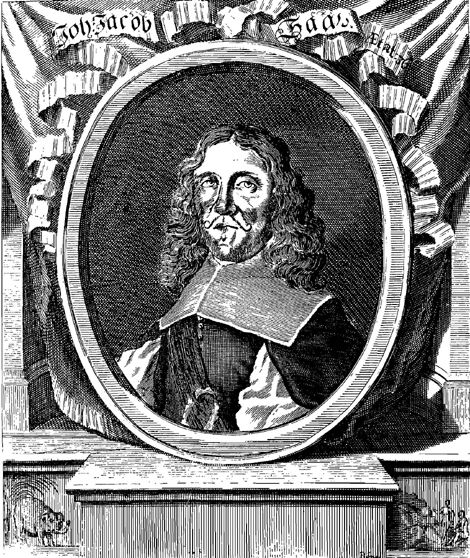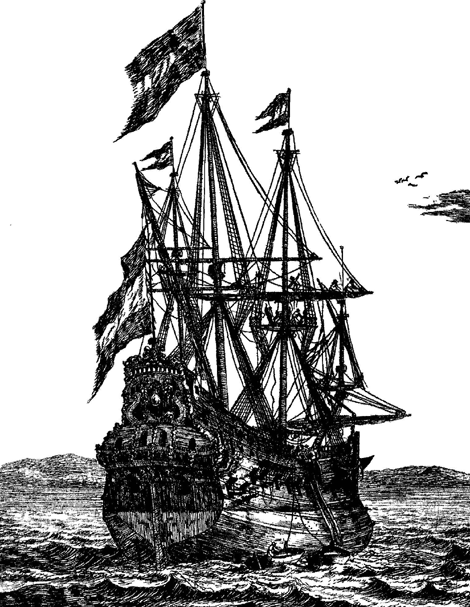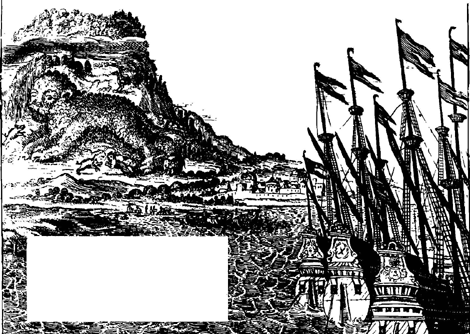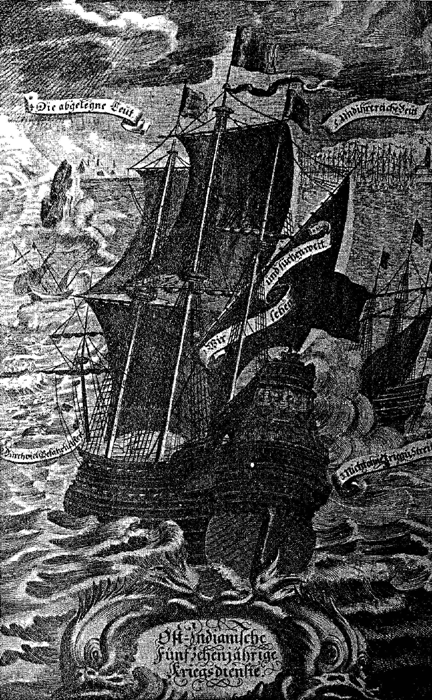|
| |
| |
| |
10 Johan Jacob Saar
(Plates 11, 13 & 14)
His ‘Funfzehen-Jährige Kriegsdienste ...’ was first published at Nürnberg in 1662, and again there in 1672; and reprinted at The Hague in 1930. This translation is from the first edition. His book is probably one of Dapper's sources, and that excellent liar Fryke (item 43) steals from it consistently.
The special interest of the book lies in the possible reason it gives why Van Riebeeck did not receive the promotion he expected and deserved. Admittedly, it is only a rumour; but anyone who has served in the ranks of any of the armed forces knows how often such ‘scuttlebutt’ proves disconcertingly true.
No writer was present at the time of the Erasmus mutiny in 1659. Herport (item 9) was there when she lay crippled in Table Bay, but sailed soon afterwards: Saar arrived with the return-fleet in charge of Sterthemius, and was there while he was investigating the case. If, as Saar alleges, this investigation produced a strong criticism of Van Riebeeck, and the threat of an adverse report on him in Holland; and if in fact Sterthemius did make such a report - and as a full Member of the Council of the Indies his opinion would carry great weight with the Lords Proprietors - then this would provide a far more cogent reason for Van Riebeeck being cold-shouldered than the vague jealousies suggested by Godée-Molsbergen in his ‘De Stichter van Hollands Zuid-Africa’.
The only contemporary source of information is the dr, from which the following extracts will serve:
September 24 [1659] ... a ship anchored at the entrance of the bay ...
25 ... The officers ... reported that she was the Erasmus, which had sailed from Batavia on January 16 [damaged in storm, took refuge in Comoros and Madagascar] ... She had lost 30 men from sickness and was very short of food and stores ... present total of 86 men ... [Her log transcribed.]
27. It has been decided that 12 to 15 men from her shall be sent ashore to help ... with the fetching of timber for the protective hedge*.
October 4 ... the eleven men from the yacht* Erasmus who have been helping [in the forest] this week ... asked to be allowed to continue ...
9. [Council decided to hold Erasmus to go home with the return-fleet expected in February.]
10, 11 ... The men from the yacht Erasmus were relieved from their work in the forest and sent back on board ...
December 14. This afternoon the Chief Surgeon, Meester Wiljam Robbertson of
| |
| |

[11] Joh. Jacob Saar, aged 36 (From item 10).
| |
| |
Dondeij, discovered a most treasonable plot: three of the ringleaders have been taken into custody ...
15. Five more were arrested, all being Servants of the Company ... and last night also the servant* of a freeman. At an examination held before the Council it was revealed that four English, four Scottish and three Dutch Servants of the Company were involved, as also a black convict and two servants of freemen. Together with fifteen slaves they had plotted first to kill the men from the Erasmus at work in the forest, then all at the Company's Granary, and finally ... everyone in the fort ... Then they were to go out to the yacht Erasmus ... seize her and sail away. [In Cape Archives codex 326, p. 138 other witnesses said that the intention was only to desert to Angola.] Most of the morning and part of the afternoon ... were spent examining the culprits and their accomplices, but apart from the one whom we got to confess yesterday, one of the ringleaders, we have not been able to force any more of them to confess. [The list given is: Peter Barber, Marcus Tomelson, Henry Wright, Stephen Nobel, English; William Morris, James Born, Alexander Crafford, Patrick Job, Scots; Hendrik Hendrikssen, Jacob Dirckssen, Cornelis Willemsen, Dutch; convict Pascual Rodrigos; freemen's servants Class Wiskebroek, Herman Schelhoven. Cape Archives codices 326, pp. 137-139, 2952 p. 25.]
17 ... three more have made voluntary confessions ...
18. Two more made a clean breast of everything, so that now five of the principals have openly confessed all.... Two others of the chief plotters are still at large: Hendrik Hendrikse of Cloppenburgh and Jacob Born of Glasco.... Nevertheless we have succeeded in arresting the following, who have all confessed: Peter Barber of Hamstede, soldier; Jacob Dirxssen of Antwerp, ditto; Patrick 't Jok of Glasco, ditto; Marcus Tommelson of Ogel, ditto; Pascual Rodrigo of Teneriffa, convict ... there are five others under arrest, and another three who are still allowed to go free ... they had known about it for three or four weeks, but none was found to have taken any part....
19.... During the night the two fugitive shepherds were captured ... there are now no more of the plotters at large....
20.... the new prisoners ... one of them, Jacob Born, made a full confession.... The other one, Hendrik Cloppenburgh ... still remained obstinate ... the chief ringleader....
23.... the full confession of the shepherd Hendrik Cloppenburgh having been received ... [Torture was used. List as above repeated, adding] Claes Wiskebroek of Lingerick.... The Council ... decided unanimously to postpone a decision ... until the arrival of the return-fleet, and further to treat leniently those who had little guilt ... and to exchange them, as also all the English and Scots found not guilty, with men from the Gecroonde Leeuw now lying in the roads, and send them to Batavia, so as to cleanse this place of weeds as far as possible. [There is a startling mistranslation here in the English version of the dr: ‘All the Englishmen and Scots ... were found not guilty’, which is of course ridiculous in view of the lists given above.] ... reward of fifty reals-of eight* [to the Surgeon].
| |
| |

[12] Paerel: see items 8, 10. She is flying the mainmast-flag as Admiral. The elaborate square stern is well shown, with the ‘Pearl’ of her name.
| |
| |
24. [Four punished for not having revealed the plot, three suspects freed] but ... they shall be sent to Batavia because Englishmen.
March 1 [1660] .. all nine ships of the return-fleet came to anchor in good order in the mouth of the bay.
12. [8 prisoners again listed.] Decided by the Council* under Sterthemius not to cause further delay [to the return-fleet] ... but to refer the further proceedings to Their Honours at Batavia ... and to divide the offenders between the next two ships [for there].
20.... the return-fleet ... set sail, and the yacht* Erasmus went with it ...
April 8. [Mention of two sent in Amersfoort, two in Walvis. But by Hague codex 3972, fol. 513-514, Barber, Born, 't Joucq and Tommelson went in Wapen van Amsterdam, Rodrigo and Dircksz. in Amersfoort, Hendricksz. and Wiskebroecq in Walvis].
That practically ends the story, since Mr. M.P.H. Roessingh of the Hague Archives (to whom I am much indebted for help during years of research) informs me that no record of the sentences passed is to be found there: in fact, all that has come to light is a letter from Batavia to the Lords XVII (Hague codex 1122, OBB 1661, folio 100) dated December 16, 1660 advising that a trial will be held in due course, and one from them to the Cape (ditto, folio 134) dated the previous day, promising that the prisoners ‘will receive full payment for their deeds’.
Saar was born in 1626, and enlisted as a Cadet* of the Dutch East-India Company in 1644. Sailed January 8, 1645 (Hague codex 4389) from Middelburg, in ship Middelburg, with Hoff van Seeland. Prevented by contrary winds from touching at the Cape. Batavia and Indonesia. Ceylon (taking of Colombo). Surat. Persia. Goa. Sailed from Batavia December 13 in (his spellings) Princ Wilhelm von Seeland, with Wappen von Holland, Perle, Princesse Royale, Dordrecht, Schlott von Honningen, West-Friessland, See Pferd, Arnheim.
Now, when about 6 weeks had passed, and we had reached the latitude of Mauritius, we were very glad, since in general there are great storms there, and when one has passed there the greatest danger is over. So we sailed more happily on to the Cape de bonn' Esperance; but now were given less water, because each ship had to carry two horses* from Batavia for the Cape, and since these need much water each of us was docked of 2 Mutsies* from the 10 which we had before, that is so much as a Can* or Measure. We often cursed the horses for this, and were glad when one of them died, though we would well have prayed for the death of the other also, since it took away each day two Mutsies of our water.
On March 1st [1660, dr] we arrived with God's help at the Cape, with three sick in our ship but none dead, and at once had the horses hoisted ashore. The next day all our water-casks were brought on deck, and well examined by the Master-Cooper and his mate, and daily filled again with fresh water. Each day we received beef and mutton, and other refreshing. Also on all ships it was forbidden (as also by notices put up) to trade* with the heathen except for ostrich-eggs and fish; but nothing of large animals such as
| |
| |

[13] From Saar, item 10. The ornamental square sterns of the ships are well shown: the Fort and town are are as imaginative as is the Lion Hill.
oxen, cows, or sheep, nor any rhinoceros-horns, on pain of the loss of all our pay.
These heathen are called Hottentots, and are barely human, short in stature, very scrawny and thin. Their speech is disagreeable, as if they were clucking like turkeys. They go naked but for a cloak of raw sheepskin around their body, and a scrap of fur to hide their private parts. When one lands they come running, and cry ‘Broqua’ in their language, that is to say ‘Bread’, and if they receive it they tread it underfoot [sic, in no other writer], and lift up their sheepskin to show how they are made, and how in childhood their left testicles* are removed. Their ornament is to smear their naked body with all sorts of fat, so that they stink very foully; and they use the guts of sheep to wind around their legs. When they kill a sheep they take a part of the gut, clean it but little from the dung within (since they merely draw it through their fingers), and then lay it on the fire; and after it has lain there for a short time they take it up again and eat it, which is a real horror to see.
It is not known what their religion is; but early, when it is nearly day, they come together, and hold each other's hands, and dance, and shriek in their tongue towards heaven: from which it may be assumed that they must have some knowledge of God, as also they themselves say if asked what is their belief, that they believe in Him who has made everything, the heavens, land, sea, and all that is on the earth.
Further, they are mighty runners. For this reason those horses* were brought from Batavia to form a Company of cavalry from among our soldiers stationed at the Cape, since they, the heathen, are in no wise to be trusted, knowing well how to do all sorts of trickery. In 1650 [sic] the Dutch first built a Fort there, at which the English ships which
| |
| |
touch there must pay for their anchorage*, as a tax.
There are all sorts of beasts on this island* [sic], especially lions, of which two skins [see Museum*] hang in the Governor's House: one was shot by the natives with arrows, the other was strangled in the jungle by a wild pig which defended itself against it. Such pigs are called ‘Iron Pigs’, and have on their backs exceedingly hard quills, black and white and a foot long, with which one can bore a hole in a cloth, or wood, or other gear, so that the tailors use such instead of bodkins. When now the said lion neared the pig, this defended itself against it, and stabbed it in the left breast near the heart, so that it bled to death, and both were found dead together. There are also many elephants here, and many ostriches, of which I have often eaten the eggs: also I once tried how many hen's eggs would go into such an ostrich-egg, and found that it would hold thirty-six. In Holland the barbers hang them in their shops, and are accustomed to keep their cotton-wool in them. I had two such, and in Batavia paid half a rix-dollar to have one of them cut open; but once when I had set it on my sea-chest a monkey which I also had, and had taught many tricks, and for which I was offered six rixdollars in the Indies, but I intended to take it home: this, I say jumped up on the chest and threw the egg down, so that it broke in pieces, at which I was so angered that I gave it a good thrashing. But it fell sick, and died soon after, so that I suffered a double loss.
While we were at the Capo de bonn' Esperance, we met the ship Erasmus, which had come from the harbour called Sardin Bai, bringing much sheep for our fleet, which Batavia had ordered the Commandeur to get for us, and we then went all out for the mutton which was only too welcome. She gave us surprising news of the dangers she had endured, not only from great storms, of which I will tell more fully below, but from her own people, and it happened thus:
The Commandeur here had treated the poor soldiers of the garrison set there as harshly and as miserably as if they had been less than serfs and slaves. By day they had to cut wood in the forests, and by night continually stand their watches. Some became so desperate at this severe oppression that they decided to make an attack on the crew of the Erasmus if they again came ashore and were busy cutting wood for their damaged ship, and were taking their meal. After this, they were to hasten to the Fortress and there repay the Commandeur according to his deserts; and then similarly kill the other Dutch freemen, except for the women whom they would take to themselves. When this was done, they would fire a gun and half-mast the flags on land, from which the rest on the Erasmus would understand, according to ship's custom, that they also should land. And then, if this succeeded, they would themselves go aboard, and all together make for Angola in the Kingdom of the Congo, the neighbouring country, and there sell the ship to the Portuguese or go over with her to Portugal. But most of those who made these plans were English, Scots and Irish who had taken service, and who now would thus act as they had done against their fellow-countrymen at home. God however let it come to light through a Surgeon, who revealed the plot to the Commandeur: he at once took horse and warned those of the Erasmus who were already in the woods, and also quickly
| |
| |
advised the freemen to hold themselves ready. Since the affair had thus come to light before they could take any action, their chief, and also the principal ringleaders, were quickly arrested and held prisoners until our fleet should arrive. When now our Admiral* and Vice-Admiral went ashore, the prisoners at once had a petition delivered to him, in which they indeed confessed their evil intent, but also alleged that the extreme severity and pitilessness of their commander had driven them to it. They had engaged to serve Holland as soldiers (as they had truly done on all occasions up to now) but not as slaves, nor to be treated worse than slaves. They therefore hoped, That the Admiral would regard the matter differently. Although now the Commandeur considered that justice should at once be done on these soldiers, our Admoral took a wider and more intelligent view of the matter, and promised them that they would be sent to Batavia with the next fleet, with his own recommendation to the Governor-General there for merciful treatment. He reproached the Commandeur for his great lack of prudence, and told him, That if with God's help he reached the Fatherland, he would let the Company judge whether he was fit for further command here. He also left, before we sailed, a letter to the Governor-General in Batavia, whither the prisoners were to be sent as soon as possible.
[Here follows an episode during the siege of Colombo.]
Since now, as I said, the folk of the Erasmus much complained of what a bad passage they had had from Batavia, with the deaths of thirty-six men, and also that they were badly stocked with provisions, and further that their ship was mighty leaky and they could not be sure of reaching the Fatherland, the more so that they had only one carpenter, all the others having died: because of all this our Admiral called all the Masters and Merchants ashore [Broad Council*], and ordered that each of our nine ships should give her four men, and something of timber, provisions and carpenters, so that everything possible should be done in order to take the ship along with us, since she should have reached Holland the previous year.
On March 12th all ships had to take on their water, and each day half the crew went ashore for two or three days, especially to buy fish from the freemen* who had come there from Holland with their wives and children [sic]. The East-India Company has thus provided for the cultivation of the land, and its sowing, and there are some thirty who have their households there half a mile* from the Fort; but they dare not go further, because of the heathen. But the Company rules that they must spend ten years in the Indies before they may go home again, and the same must also be done by any other who wishes to take his wife along; but a bachelor need sign for five years only if a soldier, the sailors for three years, but not counting the voyages out and home.
On March 15th it was ordered that all who were ashore and wished to go home were to embark, whereat we struck our yards and topmasts [more probably struck on arrival] because of the strong wind which blows seaward from the land at noon, though for about an hour only. This comes from the high hills on the Cape, of which one, the larger (which is always covered by clouds so that one cannot well discern it) is called Table Mountain, and is exactly shaped like a table, though longer than wide; and from this comes such a
| |
| |

[14] Title page to item 10, Ost-Indianische funfzehenjahrige Kriegsdienste, ‘Fifteen years East-Indian Military Service.’ The large flag at the maintop shows that the ship is Admiral. The rig is standard, with spritsail and spritsail-topsail furled, but the high
| |
| |
mighty wind that one cannot but think that ship and all would capsize, for which reason also three anchors* must be used. The second hill is called the Lion's Hill, and lies under this, on the right when one is making for the harbour: it is shaped like a lion. [For his highly-imaginative picture see Plate 13]
We indeed got the idea of making a trip up the Table Mountain, but time did not allow. However, since my friend Meester Johann Jacob Merklein, who served the Company about that time as a Barber*, made such a trip and set it down in writing, I will add it here because it is worth the reading. [Inserted, as in item 1.]
On the 16th all went aboard, and we began to send up the topmasts and yards again, and to set up the shrouds, to bring in the watercasks and all that was needed, and to embark four cows in each ship.
On the 17th and 18th everyone had to help to bring the ship into her proper shape, cleaned from top to bottom. On the 19th the sails were hoisted, and the same day the farewell-feast was given. That evening came on board our Admiral* and Vice-Admiral, the Masters and the Merchants*, and it was ordered to weigh all anchors except one [per ship]. On the 20th we sailed in the Name of God [dr].
Sargasso Sea. Northabout*. At Faroes met by the Cruisers*, bringing fit men and food, ‘which at first we could not enjoy, since our bellies would not accept such’. Discharged at Middelburg, but to Amsterdam for accumulated pay, credited from overseas. |
|